Life In The Mosaic
Critical Pieces Coming Together At The Former Johnson & Wales Campus: Schools, Affordable Housing, Culinary Programs, Welcoming Spaces
By Christopher Broderick
For the GPHN
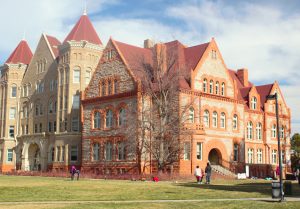
When a small group of women gathered in 1909 in a new Romanesque-style stone building standing proudly on what was then windswept open prairie, they never could have imagined what the site would become more than a century later.
Those 59 women were the entering class of Colorado Women’s College, which grew over the years to become part of the University of Denver in 1982. In 2000, it became the Denver campus of Johnson & Wales University.
Today — a year-and-a-half after the 25-acre site was purchased for $30 million by the Urban Land Conservatory, Denver Housing Authority and Denver Public Schools — the Mosaic Community Campus is emerging as an innovative home for affordable housing, education and more.
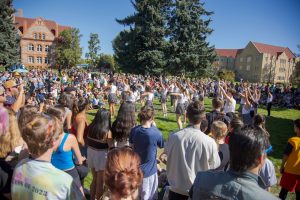
“We saw a future for the campus as a diverse, inclusive collaboration of people, groups, and organizations uniting to create a place for quality education, affordable housing, economic development, the arts and gathering,” said Amelia Wiygul, spokeswoman for the Denver-based Urban Land Conservatory.
The name Mosaic was chosen, Wiygul says, to capture the idea that each piece of the campus creates a community hub to “provide a place for people to advance their dreams and careers, connect with each other and truly thrive.”
She added that the campus is open to the public through the preservation of green spaces and historic architecture. In contrast, the Providence, R.I.-based Johnson & Wales sold one of its other campuses in Miami to commercial developers, who are turning it into retail space and market-rate apartments.
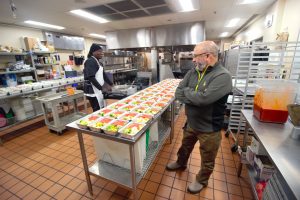
During recent visits, the new Mosaic campus remains largely quiet except for a boisterous din from children playing at recess outside St. Elizabeth’s School. The K-8 Episcopal school relocated from its old site west of City Park in 2021. The vibe will change dramatically in the coming years, when scores of families and individuals move into the converted campus dormitories, joined by hundreds of students from Denver School of the Arts who will move across Montview Boulevard to their own expanded Mosaic digs.
Dorms will be affordable housing
The Urban Land Conservatory is partnering with the Denver Housing Authority and the nonprofit Archway Communities to convert the former dormitories on the east side of campus into apartments for low-income families. Archway will develop and manage the four dorms, which will be remodeled into 154 rental studios, one-bedrooms, two-bedrooms and three-bedrooms.
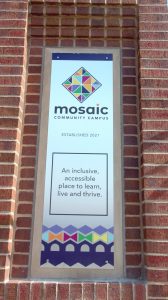
Leslie Rutherford, Archway communications director, said the project is scheduled for completion in early 2024. The apartments will be reserved for individuals whose income is within 30 percent to 60 percent of the area median income. Under current Denver guidelines for area median income, that translates to $24,650 to $49,300 for individuals and $28,150 to $56,300 for two-person households.
“We will open a wait list, likely late 2023, and we will have more information on our website when it is available,” Rutherford said. “We look forward to engaging with the community.”
The Denver Housing Authority acquired the the two former dorms at the south end of campus with plans to remodel them as affordable units for low-income residents, noting that 24 percent of families in the nearby East Colfax neighborhood are in poverty.
The Authority plans to remodel Triangolo Hall with 27 one-bedrooms and six two-bedrooms, and Gaebe Hall with 39 one-bedrooms. DHA plans to run Triangolo and is discussing a potential lease of Gaebe with city’s Department of Housing Stability. Details, such as a timeline and applications, will be announced in the coming months on the DHA website.
Learning on campus
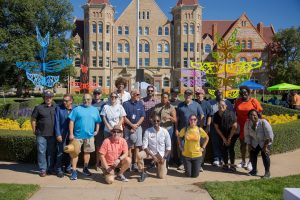
The Denver School of the Arts will expand in fall 2024 to accommodate enrollment growth. The magnet school for grades 6-12 currently has about 1,100 students studying creative writing, dance, band, orchestra, vocal music, stagecraft & design, theater, video cinema arts and visual arts. Unlike other Denver Public Schools magnet programs that utilize lotteries, DSA applicants must audition to be accepted. Demand has far outpaced capacity, and the school board last year approved $30 million to expand. DPS spokesman Scott Pribble said up to 350 students across middle and high school will be added in 2024, with up to 700 more in following years. The Mosaic site will serve high school students, while middle schoolers will stay at the current DSA building across the street.
St. Elizabeth’s School, an Episcopalian K-8 school with a diverse enrollment of about 150 students, moved from its former location at 23rd Avenue and Gaylord Street to Mosaic in time for the beginning of the 2021 school year. The school occupies the historic Centennial Hall in the middle of campus. Originally named Treat Hall, it was built in the 1890s for Colorado Women’s College. The landmark building was shut down for 30 years until Johnson & Wales completed a $17 million renovation in 2015. St. Elizabeth’s made additional updates, converting the building into K-8 classrooms with a new outdoor playground.
The Kitchen Network
Kitchen Network is a nonprofit that supports local food entrepreneurs by providing access to 10 commercial-grade kitchens as well as job training, networking, business development and other services. Chefs and students prepare food for restaurants, food trucks, catering companies, shelters and the airport. Located on the east end of campus, Kitchen Network maintains a 43,560 square-foot facility with kitchens, classrooms and dining halls. It hosts a wide array of tenants and services, including:
• Work Options, a nonprofit that trains adults whose challenges include recent incarceration or housing insecurity to develop culinary skills, life skills and job readiness in the food industry.
• The apprenticeship and associate degree programs of Rocky Mountain Chefs of Colorado.
• Food preparation for cancer patients by Faeth Therapeutics, a new research-based firm that focuses on individually tailored nutrition designed to deprive tumors of nutrients while providing foods that support healthy tissues.
“We also will be opening a commissary here soon that will focus on incubation – helping people entering the food industry not only with culinary skills but with finances, licensing, permitting — the kind of things that often prevent them from succeeding,” said Jorge de la Torre, director of culinary arts at Kitchen Network. De la Torre noted that about half of restaurant startups fail for reasons that have nothing to do with the quality of their food.
Connecting with the neighborhood
Mosaic organizers hosted a block party Sept. 14 for Park Hill and the surrounding neighborhoods that featured DSA student performances, food trucks and activities. More events to connect with neighbors are coming as the campus takes shape.
“All the tenants here are committed to make this an open space for the public to come and enjoy,” said de la Torre, who was culinary dean at Johnson & Wales for 19 years prior to transitioning to Kitchen Network. “This is a second chance for this site — which could have been razed — to serve the community in so many different ways.”
A Cup Of Confidence
Working To Learn At DIRT Coffee Shop
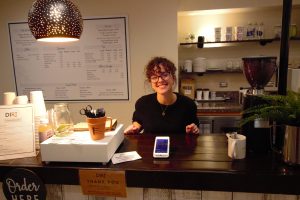
“We want people to feel warm and welcome.”
That’s how Catharina Hughey describes the goal of the new DIRT Coffee on the Mosaic Community Campus.
But the mission here is far different than a typical Denver coffee shop.
DIRT stands for Divergent Inclusive Representation Transforms. What that means is the shop is a social enterprise that creates paid internships, training and retail experience for people with little or no work experience who have cognitive issues such as Down Syndrome, autism, attention deficit hyperactivity disorder (ADHD), palsy, Tourette Syndrome or similar disabilities.
“We predominantly work with young adults,” said Hughey, executive director of DIRT. “We create an inclusive culture for them. The two biggest things we want them to take away from this experience is to develop confidence and be able to advocate for themselves.”
Hughey operates a DIRT Coffee in Littleton and opened the Mosaic location in September. Open to the public, it’s in the Kitchen Network building at 1785 Quebec St. (look for a small sign in front of the building on the east side of campus). DIRT is open Tuesday through Saturday 7 a.m. to 1 p.m. serving Huckleberry Roasters coffee, espresso and breakfast items such as burritos and pastries.
What drew her to Mosaic was the “work to learn” campus ethic that emphasizes education, personal development and commitment to underserved communities.
“It’s a great fit for us,” she said, crediting Kitchen Network for critical support beyond hosting the location. “Our values align really well together.”
For more information, such as the intern application process and other details, go to DIRTcoffee.org.
— Christopher Broderick
